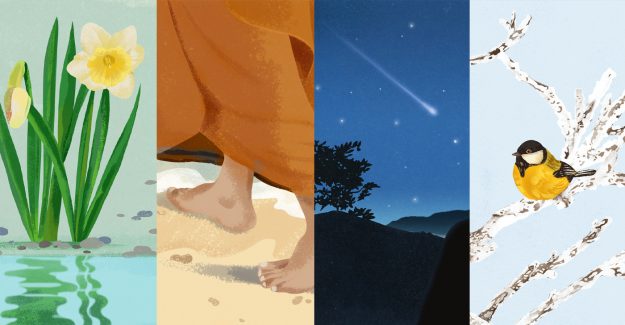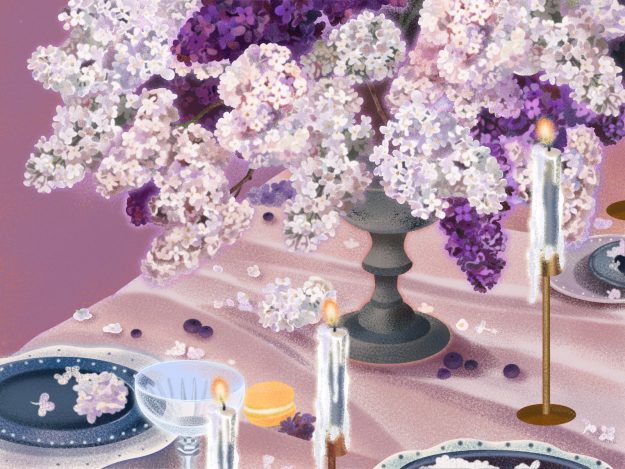
At seventeen syllables, haiku is the shortest poem in world literature. It is now also the most popular form of poetry in the world, written in nearly every language. And yet, as haiku has spread internationally, one of the most important aspects of the tradition has largely been lost—the community of poets.
In Europe and the United States, haiku is often regarded as the domain of literary elites, but this is not the case in Japan, where haiku is deeply rooted in communal activity. Millions of amateur Japanese poets belong to haiku groups (clubs, really), which are sponsored by different “schools” of haiku, each with its own magazine. Most daily and weekly newspapers carry a haiku column featuring poems submitted by their subscribers, sometimes on the front page.
To help bring back this social dimension, we are inviting our readers to participate in the monthly Tricycle Haiku Challenge. Each month, moderator Clark Strand will select three poems to be published online, one of which will appear with a brief commentary. Each quarter, one of these poems also will appear in the print magazine alongside an extended commentary. In this way, we can begin to follow the seasons together—spring, summer, fall, and winter—and share the joy of haiku together as a community.
Requirements:
Anyone can submit haiku to the monthly challenge using the form below. To be considered for publication, your haiku must:
- Be written in three lines of 5, 7, and 5 syllables:
Getting the syllables of a haiku to sit naturally inside of its seventeen-syllable form is the primary challenge. Each haiku is a word problem in search of a satisfying seventeen-syllable solution. - Contain the “season word” assigned for that month:
A haiku isn’t only a word problem. To the seventeen syllables the poet must add a turn of thought that results in more than seventeen syllables of meaning—along with a word that refers to one of the four seasons. How the poet uses “season words” like autumn sun or dew will typically determine the effectiveness of the poem.
Part of the reason haiku appeals to so many people is that its rules are simple and easy to follow, yet it can take a lifetime to master them. Ten million people currently write haiku in Japanese. There is no reason why millions can’t write haiku in English, too, provided they agree on the basics. The turn of thought you add to that simple formula of 5-7-5 syllables with a season word is entirely up to you.
Submissions close on the last day of the month at 11:59 pm ET, and the results will be posted the week after. Monthly submissions are anonymized and the winning poems are selected in a blind process.
To learn more about the history and principles of haiku, check out Clark Strand’s online course with Tricycle, “Learn to Write Haiku: Mastering the Ancient Art of Serious Play.”
This Month’s Season Word:
Submit as many haiku as you please using the submission form below. Just be sure to include this month’s season word.
Summer season word: “Crab”
the tilted shoreline
makes it easy for the crab
to run to the sea
Submit as many haiku as you please on the season word “crab.” Your poems must be written in three lines of 5, 7, and 5 syllables, respectively, and should focus on a single moment of time happening now.
Be straightforward in your description and try to limit your subject matter. Haiku are nearly always better when they don’t have too many ideas or images. So make your focus the season word* and try to stay close to that.
*REMEMBER: To qualify for the challenge, your haiku must be written in 5-7-5 syllables and include the word “crab.”
Haiku Tip: Start a Conversation with A Famous Haiku!
My 1997 book Seeds From a Birch Tree: Writing Haiku and the Spiritual Journey includes the following short chapter about a poem that uses this month’s season word:
CRAB
In time of danger
the crab only needs to go
into a drainpipe.— Yamaguchi Seishi
(trans. by Alfred Marks and Takashi Kodaira)
About this poem the poet wrote only:
When danger approaches a crab, he runs and hides, like the crab I watched flee to safety in a drainpipe. A crab finds it simple to save his life.
The poet makes no mention of the house he lost in a bombing raid only a few years before, but the feeling of that loss—and other, more significant losses from World War II—permeates the poem.
Composed in 1949, Seishi’s haiku was at the back of my mind a few summers ago when I wrote this month’s sample poem on a beach at Cape Cod.
The crab I saw wasn’t fleeing danger like Seishi’s. There hadn’t been a battle fought on the Cape since 1918, when shells from a German U-boat fell on Nauset Beach in the only recorded attack on mainland U.S. soil during World War I. What struck me was how the sloping shoreline made it easy for the crab to run back to the sea.
The rightness of that felt playful and possibly profound—as if the shore, the sea, and the crab were “made for one another” in way that humans would find difficult to appreciate or understand. “Deep Ecology” they call it, but to my way of thinking that just meant a world that made it easy for a crab to return to the ocean.
Seishi’s crab found it “simple to save his life” by fleeing into a drainpipe. I thought my crab was probably happier—and safer—running downhill into the sea.
A note on crabs: Crabs live in all of the world’s oceans, as well as in freshwater streams and rivers, and even on land. One of the oldest, most adaptable animals on earth, crabs are omnivores, which may explain why they have survived for over 200 million years. Their exoskeletons are typically thick and hard, and they usually have five pairs of legs,
including two pinchers.
Crabs are an important food source for humans and figure prominently in the myths of many cultures, where their symbolism varies widely. They are associated with protection and setting boundaries, nonlinear problem-solving, intuition, emotion, and the subconscious.
May’s Winning Poem:
Spring season word: “Lilac”
before the big storm
I go out and cut lilacs
trying to save spring
— Kelly Westhoff

You can find the honorable mentions, additional commentary, and May’s haiku tips here.
Previous Winners
|
2021 |
2022 |
2023 |
|
2024 |
2025 |
|
June |
|
|
July |
|
|
August |
|
|
September |
|
|
October |
|
|
November |
|
|
December |
♦